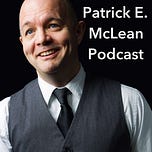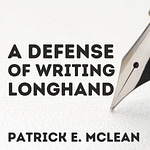
For the last year or more, I’ve been thinking and reading a lot about argumentation. Which, in it’s oldest form, is known as Rhetoric (in the best sense of the word) how do you use speech (and writing ) to persuade people.
I’ve always viewed what I do as form of argumentation. I mean one way I can account for my usefulness to my clients is that I’m extraordinarily good at uncovering the best argument and then giving it, it’s most powerful articulation.
This is something different than what most marketers and certainly copywriters do. Most of the talented people who remain in what’s left of the ad game proceed a bit differently. They think in ‘trends’ they try to capture or tap into the Zeitgeist. The foolish among them think that they make or shape culture. And when all of that goes wrong in a self-important, self-congratulatory bubble, you get that Kylie Jenner Pepsi ad.
But even the best of them, and certainly the sales and marketing departments that drive them forward, have contempt for their customers. In fact, it is surprising how many business people I’ve worked with have some kind of contempt for the consumer.
But this isn’t really my point. My point is about argumentation as a process, as way to get to truth and come to consensus. I think we’re losing it. And I think we’re we’ve been losing it for the last 300 or so years.
This recent business of labeling anyone who disagrees with you as a racist is part of it, but also not what I’m talking about.
{So you can understand what I think is going on, and get more use of argumentation as a process — I’m going to have to go on a bit of a digression. But bear with me, it’s worth it. }
So think of it this way. When you don’t have science, persuasion and argumentation is everything. There aren’t any experiments, and the experimental method isn’t really countenanced. The sophists (who might not have been this bad actually, it seems we only know of them through their biggest competitors, mainly Plato) would charge huge sums to teach young men how to make the weaker argument appear the stronger.
Which is a nice trick if you can do it. And the reason the word Sophist has become an insult.
But after the Enlightenment, we get to a place where we reach agreement about reality through independently verifiable and repeatable observations. I make my case through an experiment which you can also repeat. And if I make a claim, you don’t believe me, so much as you believe the data.
And from these experiments, we can derive laws about how the universe works. And use them to accurately predict what will happen.
Now this fantastic.
And I mean that. It’s not to be underestimated, for a whole host of reasons, including every comfort you’re enjoying right now. But here’s one of my current favorites. With science. it doesn’t’ matter who you are. Black, white, male, female, gay, straight — or any other division you can think of — sure people are still horrible and sexism and racism still happen, but there’s no taint of who you are attached to your thinking.
It’s either true or it isn’t. Or useful (pragmatically true) or not.
So the Nazis had a terrible case of not-invented here. Or, at least, not invented by Aryans. They described Jewish science as being as diseased — as they described the Jews themselves. Which means that Einstein and Oppenheimer are wrong and you can’t use their thinking in your race to build the atomic bomb? It’s utter lunacy. And thank God for Fascists being dumb.
But, there’s a problem lurking here. Science is great for describing the material world — what is and how you can manipulate it. But, as Immanuel Kant claimed, you can’t go from what /is/ to what /ought to be./
Now I don’t want to get in the middle of a bunch of philosophers arguing about Kant, but I will say this:
The central challenge facing anybody or any organization is what /should/ we do. And for these biggest shoulds, science isn’t all that useful. Especially in the development of rhetoric and persuasion.
Because, if you buy into the scientific method, you can think that there’s no place for persuasion. Because, the scientific method suggests that if you lay out all facts, everybody will come to the same conclusion. The data will tell us what should be done.
Now if you’ve ever met people, you know that this idea is nuts. But I can’t find any other justification for why the serious study and cultivation of rhetoric just stopped for about 300 years and is still on the ropes from what I can see.
You’ve probably heard this parable about three blind men and an elephant. Three bling guys men have never come across an elephant before, and, when they do, each man feels a different part and tries to describe the elephant to the others. The one who feels the trunk insists the elephant is a kind of snake. The one who had a leg insists that it was like a tree, etc. An argument ensues.
In some versions of the parable, the blind men are so irreconcilable in their arguments that they come to blows. In others, they hash out their differences and develop a more complete picture of the elephant.
There are many points one can take from this story. But, for me, the useful point isn’t that the truth is complicated or difficult to know. Or even that sincere people can have reasonable disagreements about what is the case. It’s that argumentation is a process by which we collectively figure out what is really going on and what should be done about it. And if I that’s right, it would have to make argumentation the single most important process for business.
The world is changing faster than ever. And we’re all struggling to keep up. So running any kind of an organization is a matter of figuring out what should be done, then how do to it, then getting it done.
I have been my own boss for more than 18 years and whenever a friend comes to me with ideas of striking out on their own, I always tell them the same thing:
You’ve probably spent your entire working life with a boss who told you where the goalposts were, then told you you were doing a good job when you got the ball through them. And if you go out on your own, you’re not going to have that. And not having that is going to be very disorienting at first. And, just like I did, you are going to underestimate how much time and effort it takes to figure out what you should be doing.
Now, multiply that problem by a global organization. Say Amazon. A very big, fast-moving elephant.
Amazon has a very particular way of arguing. Most of it is done in writing — in a document called a six-pager. You lay out your argument in writing. And then people discuss it. It’s even baked into their leadership principles. Have Disagree and Commit - Leaders… disagree even when doing so it uncomfortable or exhausting. Leaders have conviction and are tenacious. They do not compromise for the sake of social cohesion. Once a decision is determined, they commit wholly.
The way I think great executive teams do that is they argue. And the more trust they have in each other, the more vigorously they can argue. All the positions can be laid out and explored. Then, if there is trust there, a direction can be picked, and even the people who disagree will be on board.
So, if you can improve one process about a company or a family or a marriage to guaranteed to make it run better, is it argumentation?
I think it is, but I might not be a true philosopher, I might just be a sophist who’s so good that I’m fooling myself.
But try it on for size and see. Adopt a steel man rule. Which is that, in an argument, everybody has to lay out the other person’s argument so well that they say, “That’s right. That’s exactly what I’m saying.” Or ideally, “That's right. That’s even better than I could have put it myself.”
This is a brilliant strategy for negotiating because the other person feels heard. Chris Voss, former chief hostage negotiator and author of the brilliant “Never Split the Difference” calls this ‘Tactical Empathy’. I highly recommend his book. It’s both entertaining and brilliant.
But beyond negotiation - what this rule does is ensure that as much information is transferred. Get it all out where everybody can understand it and think about it.
It’s the same thing with Amazon’s six-pager. The argument is fully laid out to the best of someone’s ability. And when the meeting starts where they are going to make a decision — everybody in the room takes the first 20 minutes and reads the paper.
Then, only after everybody has really thought about it, does anybody open their mouth to speak about it.
No wonder their arguments are so productive. No wonder Amazon is so successful.
If you’re interested in this rhetoric I can recommend, “Thank you for Arguing. — What Aristotle, Lincoln and Homer Simpson can teach us about the art of persuasion. by Jay Heinrichs” As an easy way in.
Aristotles Rhetoric is indispensable and for a more modern deep dive, I personally got a lot out of, “The New Rhetoric” by Pereleman and Olbrechts-Tyteca (there’s no way I’m pronouncing that correctly, but links are in the show notes.










